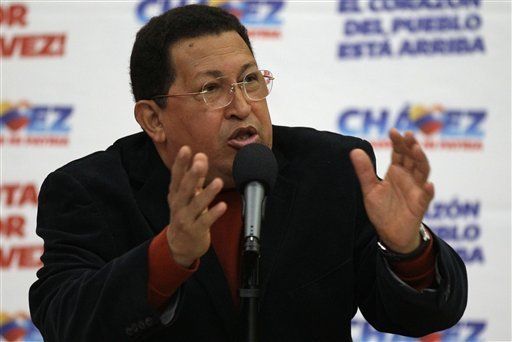Latin America
Related: About this forumHugo Chavez and the Non-Aligned Movement seek an end to Syria’s turmoil
[IMG] [/IMG]
[/IMG]
On Tuesday, Hugo Chavez announced he would consider efforts to end the Syrian conflict through collaboration with the global Non-Aligned Movement (NAM). “Hopefully we can somehow help to achieve peace in Syria, whose people are being run over by this imperialist, violent politics,” he announced during a recent press conference. With action to resolve the political crisis stalled in the UN, this group of 120 countries seeks to take the reins.
History and Revival
The Non-Alignment Movement began in 1961 as an alternative to the spheres of influence dominated by the US and USSR. Founded by Sukarno of Indonesia, Nehru of India, Nasser of Egypt, Nakruma of Ghana, and Tito of Yugoslavia, the movement represented the rising powers of the developing world. From the end of the Cold War until 2003, the movement ceased to its hold summits. But since then, the last few summits have revived the movement and membership has increased and now includes China as an observer.
Notable attendance at this year’s conference in Tehran included:
Sudanese President Omar al-Bashir, North Korea’s parliamentary chairman Kim Yong-nam, Venezuelan President Hugo Chavez, Bolivian President Evo Morales, Zimbabwean President Robert Mugabe, Indian Prime Minister Manmohan Singh, Cuba’s Raul Castro, Egyptian President Mohamed Morsi, Afghan President Hamid Karzai, UN Secretary General Ban Ki-moon and Indian Prime Minister Manmohan Singh.
During the conference, leaders condemned unilateral sanctions, backed the right of Iran and other states to peaceful nuclear energy and supported the creation of a Palestinian state. They also advocated for nuclear disarmament and “human rights free from political agendas.”
Non-Aligned Interventionism
In considering NAM’s desire to resolve the situation in Syria, many questions arise. How does a movement championed most strongly by leaders without a good sense for human rights, stand to effectively fix a massive humanitarian catastrophe? And moreover, how does a non-aligned movement, opposed to intervention, plan on intervening and aligning itself with one side of the conflict?
The Free Syrian Army will not lay down its weapons until Bashar and his government resigns, making an effective solution to the conflict hinge upon the triumph of one side over the other. Attempts by the NAM to keep Bashar in power while simultaneously ending the violence, would require the complete annihilation of the FSA. But even the extermination of an insurgency will not end the root of discontent that originally created it. The domination of Syria’s politics by a single dynasty must end before long-term peace can be achieved.
Additionally, division within NAM hinders efforts to draft a unified approach for conflict resolution. Mohammad Morsi of Egypt strongly criticized Bashar’s delegation for its disregard for basic human rights and called on the leader to step down. Meanwhile, Venezuela and Iran continue to support the continuation of Bashar’s regime.
Noble Intentions
Despite the dubious human rights credentials among many of the movement’s champions and the contradictory nature of their Syria proposal, NAM’s stance against dominant world interests interfering in domestic politics, is not without merit.
In fact, George Washington was one of the first to warn against the pitfalls of US interventionism. In his 1793 farewell address, he spoke strongly against the formation of global spheres of influence:
The nation which indulges towards another a habitual hatred or a habitual fondness is in some degree a slave. It is a slave to its animosity or to its affection, either of which is sufficient to lead it astray from its duty and its interest…
History and experience prove that foreign influence is one of the most baneful foes of republican government.
Over the next two centuries, US world power grew up with the nation. As a dominant global player, the projection of US interests became increasingly unavoidable. The more that the US involved itself in the affairs of other countries, the greater its stake in a favorable outcome became – hence, perpetuating the extension US efforts to secure the success of a favored side in conflicts throughout the world.
NAM’s fundamental problem, is that it cannot be both a champion for non-intervention, while seeking to involve itself. Involvement requires a certain guiding interest in the triumph of one faction over another, but non-alignment opposes favoring a specific political position.
The value of such a movement rests on its resistance to interfering in the sovereignty of nations and its opposition to the division of the world into blocs of interest led by a few powerful states. NAM defends self-interest from the interests of others. As it is the responsibility of the UN to alleviate humanitarian catastrophe; perhaps, NAM will help ensure that such efforts exclude the use of military force.
http://revpana.wordpress.com/2012/09/12/hugo-chavez-and-the-non-aligned-movement-seek-an-end-to-syrias-turmoil/
COLGATE4
(14,732 posts)Sudanese President Omar al-Bashir, North Korea’s parliamentary chairman Kim Yong-nam, Venezuelan President Hugo Chavez, Bolivian President Evo Morales, Zimbabwean President Robert Mugabe, Indian Prime Minister Manmohan Singh, Cuba’s Raul Castro, Egyptian President Mohamed Morsi, Afghan President Hamid Karzai, UN Secretary General Ban Ki-moon and Indian Prime Minister Manmohan Singh.
Tells you all you need to know.